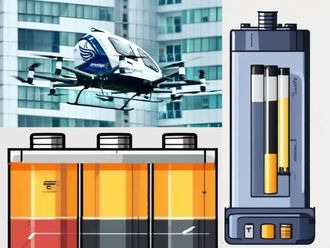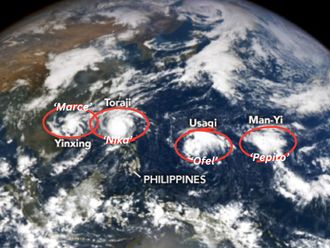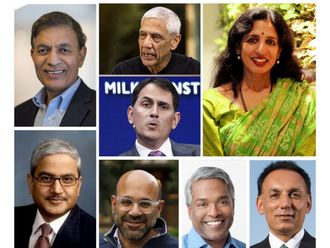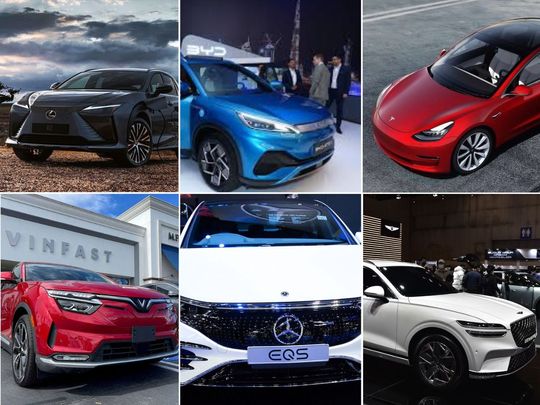
Highlights
- 'New energy' vehicles are rolling out everywhere, with self-driving-capable cars advancing at a remarkable pace.
- Countries are speeding up electrification, mandating phaseout of internal combustion engine vehicles, with bold timetables, from as early as 2025.
The car industry has gone on overdrive. Electrons have become the high-demand fuel igniting the EV transition, powered by a rapidly-advancing battery technology, manufacturing efficiencies, and faster computing power.
Despite the expected push-back, a new industry has emerged: Cars have become computers on wheels. And everyone wants to squeeze more juice from the same weight of battery. Things are happening pretty fast.
Now, the race is on for a compelling 500-km range EV for $30,000 or less. This drive runs on double turbochargers: a shift in consumer demands and government policy.
EV sales: 15% of all new vehicles
The result: Global EV sales skyrocketed in 2023, with over 13 million units sold worldwide, representing a 15 per cent of all new light-duty vehicles (LDVs) purchased.
China, Europe, the US, and India dominated the EV market, collectively accounting for nearly 9 out of every 10 EVs sold globally, according to the International Council on Clean Transportation (ICCT).
It’s a wild ride for everyone involved – manufacturers, dealers, service providers and consumers alike.
It gets even crazier: a new breed of consumers expect the next-generation vehicles to drive flawlessly – on their own or “autopilot” – with a 100 per cent safety record, able to deal with every edge case.
Meanwhile, policy-makers are pushing the new EV era, sort of forcing the spring. Several countries have implemented or announced plans to phase out the sale of new internal combustion engine (ICE) vehicles, in favour of their electric-powered siblings.
Here's a breakdown:
Norway: 2025
No ICE vehicle sales by 2025 in this Nordic country. Norway has pioneered the global EV shift, aiming for a complete ban from as early as next year. Norway has achieved an impressive EV sales market share of 82.4 per cent in 2023.
This means that nearly nine out of 10 new cars sold in the country were electric, solidifying Norway's position as a global leader in EV adoption. The 2025 ICE ban, a bold move by the candinavian nation, has positioned Norway as a global leader in sustainable transportation and inspired other countries to follow suit.
Iceland: 2025
Full ICE ban by 2025. Iceland is another Nordic nation leading the charge towards electric mobility. The country has a relatively small car market, but has made significant strides in EV adoption, andfaces unique challenges due to its geographic isolation and climate. Still, Iceland has adopted aggressive electrification targets. As of 2022, the market share of electric vehicles in Iceland is around 60 per cent. EVs and hybrids accounted for 64 per cent of vehicle sales in the first 5 months of 2023, according to the Iceland Review publication.
Netherlands: 2025 (Amsterdam only)
From 2025, ICE ban initially starting in Amsterdam. The Dutch capital (population: 1.45 million) is accelerating its transition to a zero-emission city. Starting in 2025, large parts of the Dutch capital will be off-limits to newly registered petrol, diesel, and hybrid taxis, vans, trucks, scooters, and mopeds.
Sweden: 2030
ICE vehicles ban by 2030: Sweden is leading the charge towards a fossil-free future by banning the sale of new gasoline and diesel cars from 2030. This ambitious target, announced by Prime Minister Stefan Löfven in 2023, places Sweden among a growing group of nations committed to phasing out internal combustion engine vehicles. In fact, it's the 10 country to set a concrete end date for the sale of such cars.
Slovenia: 2030
Slovenia has announced plans to phase out the sale of new gasoline and diesel cars by 2030. This move aligns the country with other European nations committed to reducing carbon emissions. The country will focus on expanding charging infrastructure and promoting electric vehicle adoption to support the transition.
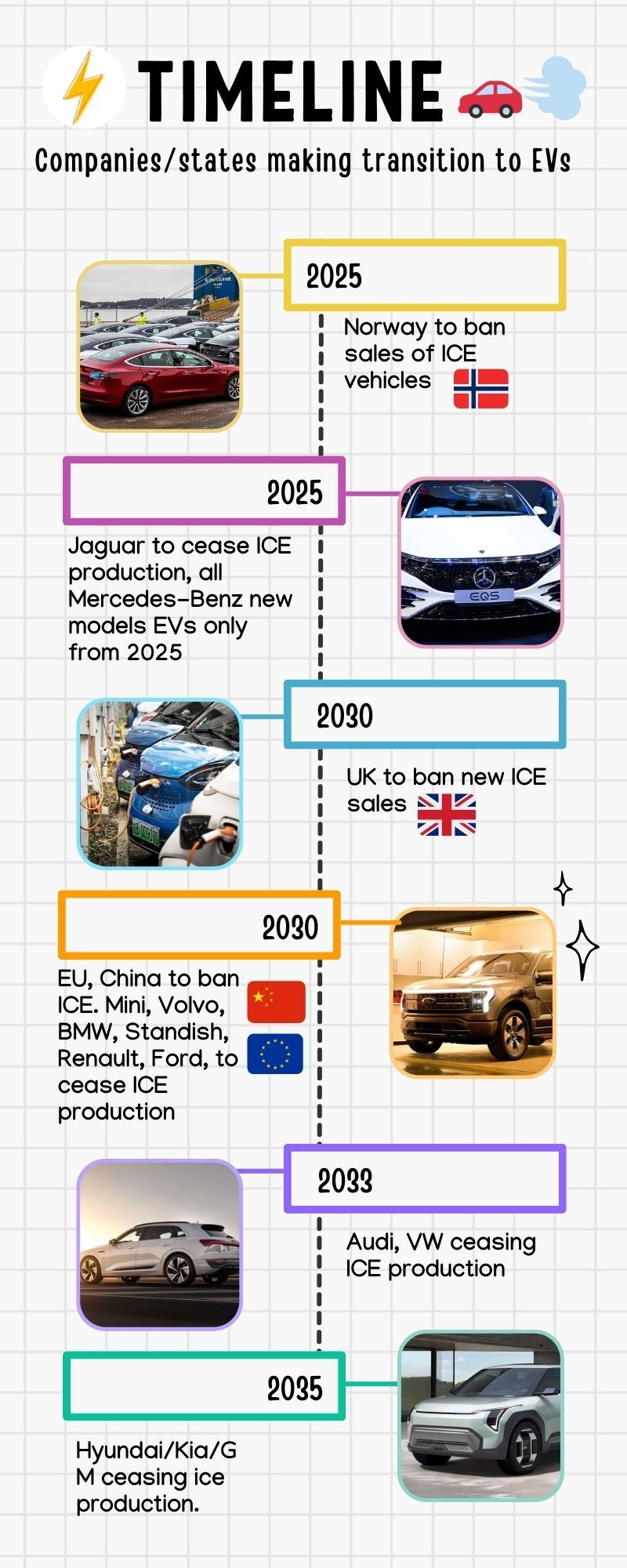
United Kingdom: 2030
The UK has set its sights on a cleaner future by announcing plans to ban the sale of new gasoline and diesel cars by 2030. This ambitious target is part of the country's commitment to reducing carbon emissions and promoting electric vehicle adoption. The government is expected to invest in charging infrastructure and incentives to support the transition.
France: 2035
France has joined the growing number of countries committed to a greener future. The nation has announced a ban on the sale of new gasoline and diesel cars by 2035. This ambitious target aims to reduce carbon emissions and promote electric vehicle adoption. The French government will invest heavily in charging infrastructure and incentives to support the transition.
European Union: 2035
Set a target for all new cars and vans to be zero-emission by 2035. Europe's EV market share remained steady at 21 per cent, while the US made significant strides, surpassing the 1 million mark for the first time, ending the year at 1.4 million EV sales.
China: 2035
By 2035, all new vehicles sold in China must be powered by 'new-energy', the Chinese authorities have said. Half of them must be electric, fuel cell, or plug-in hybrid – the remaining 50 per cent, hybrid vehicles. China, the world leader in EV manufacturing, is experiencing a significant increase in domestic EV vehicle sales.
China solidified its position as the world's largest EV market, with sales exceeding 7 million units, capturing a third of its new LDV market. In March 2024, new energy vehicles (NEV, i.e. battery-only + hybrid vehicles) sales in China topped 40 per cent of overall car sales for the first time, according to retail sales reported by the China Passenger Car Association.
US: 2035
The US is ready to take on this mission on a state-by-state basis, with large states like California already mandating a 35 per cent EV sales increase of its total car sales by 2026 with its Advanced Clean Car II Regulations. Eleven (11) other states are set to follow California’s lead.
Canada: 2035
Currently, the federal government has mandated that all new vehicles sold in Canada be zero-emission vehicles by 2035. Interim targets of reaching 20 per cent by 2026 and 60 per cent by 2030 are set.
South Korea: 2035
Plans to phase out ICE vehicles by 2035. Sout Korea considers EV and hydrogen vehicles to be zero-emission vehicles (ZEVs). During his election campaign in early 2022, the current President Yoon Seok-yeol pledged to set a target to phase out new registration and sales of ICE vehicles by 2035.
Japan: Mid-2030s
While not having a specific ban date, the country is rapidly shifting towards electric vehicles. In 2020, Japan's state broadcaster NHK reported that by the mid-2030s, all new vehicles sold in Japan will be "either hybrid or electric" as the government steps up efforts to meet its carbon neutrality target by 2050. The Ministry of Economy, Trade, and Industry set a goal of achieving "100% electrification" over the next 15 years, a move aimed at phasing out ICE cars from the new car market.
India: 2047
India is aiming to become a developed nation by 2047, with a strong emphasis on electrifying its transportation sector. The government has unveiled plans to boost EV adoption through tax breaks and production incentives, while also mandating the installation of charging stations nationwide. To reduce carbon emissions, the country is also prioritising rail transportation over road freight.
The Indian EV market doubled in size, reaching 2 per cent of its new light-duty vehicles (LDV) sales. Indian consumers, meanwhile, have shown growing interest in electric mobility. Several manufacturers are investing in battery manufacturing and EV production.
Note: We will update these dates as new information becomes available. These are target dates, and actual implementation timelines may vary based on technological advancements, infrastructure development, official policy and market conditions.



